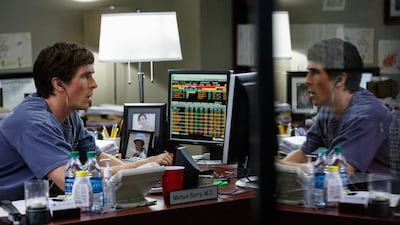Michael Lewis has a knack for telling complex stories by finding the colourful characters who lived them. He is a consummate journalist who turns obscure subject matter into relatable, easy-to-follow personal struggles. These personal struggles make for good screenplays. The Blind Side and Moneyball have been given big-screen treatments. Flash Boys, which tells the story of one of the driest and most technical financial market developments imaginable, high-frequency trading, is under development.
The Big Short tells the story of the financial crisis from the perspective of financiers who grasped the implications of the toxic, parasitic waltz of Wall Street and real estate lenders before anyone else.
Directed by Adam McKay, who also directed Anchorman, and starring Brad Pitt, Christian Bale, Steve Carell and Ryan Gosling, the film alternates between an energetic, comic documentary style and realist reenactments of the book. Explanatory interludes are intended to enable viewers to make sense of financial arcana. In one memorable discarding of the fourth wall, Selena Gomez and Richard Thaler explain how Collateralised Debt Obligations work in the context of a casino. The editing in these sections is heavy and played for laughs.
The tone careens around violently, as we switch between comic segments and the solid, realist ensemble drama at the film’s core.
The performances of Carell, Pitt, Bale and Gosling are great. Gosling plays amusingly against type as an utterly repugnant investment banker, while Bale is excellent as the awkward Michael Burry, who analyses spreadsheets while listening to Master of Puppets by Metallica at anti-social volumes. After an excellent performance in Foxcatcher, Carell shows that he shouldn't be underestimated as a serious actor.
The Big Short in book form does a very good job of making the technical aspects of the crash accessible to everyone and their grandma, which makes the film's task considerably easier. McKay's comic scenes are a bit jarring when placed next to the strong and mostly serious drama that forms the main strand of the story. In one scene, Carell, who plays a fictionalised version of the hedge fund manager Steve Eisman, mourns the suicide of his brother. A few minutes earlier, we saw Margot Robbie in a bubble bath explaining what subprime loans are. McKay might think his style "hyperkinetic"; really, it's grating.
Thanks to Lewis’s reporting, this is a great story, and one that is well-suited for the screen. A lighter touch from McKay would have made this a great film, too.
Q&A
What does the film tell us about the financial crash?
The banks produced vast quantities of awful mortgages, parcelled them into complex structures, bribed ratings agencies to give them a seal of approval stating that they were as safe as houses – and then shovelled them en masse into the financial system. Funds around the world bought the structures and complex derivatives that were only tangentially related to the value of the loans that were meant to underpin them. When the mortgages soured, an exponentially larger value of assets went down the tubes.
So whose fault is all this?
The investment banks. The ratings agencies. The economists who told the banks and agencies that they were doing OK. The pressure groups who lobbied for looser bank surveillance. Alan Greenspan, who opposed derivatives regulation, because he was a devotee of right-wing free-market cultist Ayn Rand.
Have we learnt anything from the crash?
Plenty of people now understand the causes and consequences of the financial chaos that engulfed America and damaged the welfare of millions after 2008. The US passed the Dodd-Frank Act, an attempt to rein in some more extreme and specific forms of bank misbehaviour, while Basel III guidelines now stipulate that banks must hold higher levels of capital – making it harder, but not impossible, for banks to take on the levels of debt that make product-based chicanery especially damaging. The lack of criminal penalties for senior bank executives, and the reappearance of financial products similar to those at the height of the crisis, suggest that not much has changed.
abouyamourn@thenational.ae
Follow The National's Business section on Twitter

